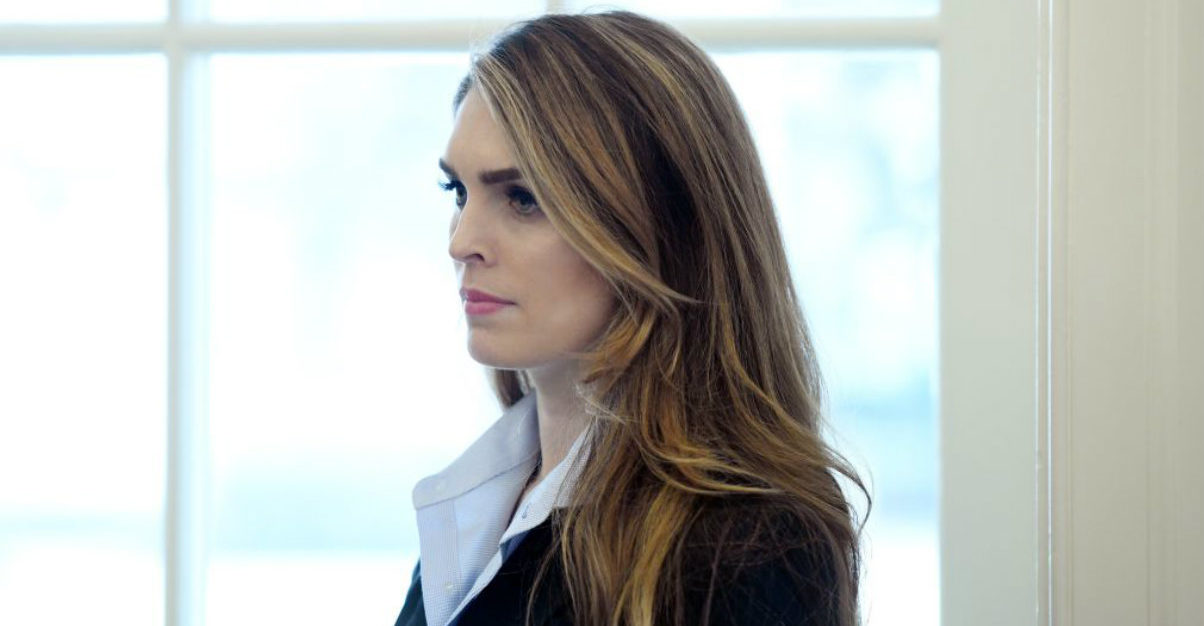
Former White House communications director and former press secretary for the Trump campaign Hope Hicks was one a number of individuals highlighted Thursday morning in the Southern District of New York, where search warrants related to ex-Trump attorney Michael Cohen’s campaign finance violations were unsealed. According to the documents, Hicks was one of multiple individuals in the loop regarding alleged affairs with then-candidate Trump ahead of the 2016 election. People are now wondering if there is a congressional perjury referral in her future.
The “1001 violation” mentioned above is a reference to 18 USC § 1001, which makes “any materially false, fictitious, or fraudulent statement or representation” a federal crime. This is what the statute says:
(a) Except as otherwise provided in this section, whoever, in any matter within the jurisdiction of the executive, legislative, or judicial branch of the Government of the United States, knowingly and willfully—
(1) falsifies, conceals, or covers up by any trick, scheme, or device a material fact;
(2) makes any materially false, fictitious, or fraudulent statement or representation; or
(3) makes or uses any false writing or document knowing the same to contain any materially false, fictitious, or fraudulent statement or entry.
If this statute seems familiar, that’s probably because former special counsel Robert Mueller busted multiple people for it, including Cohen.
The Cohen warrants showed that the FBI investigator reviewed telephone records and came to the conclusion that Donald Trump, Cohen and Hicks were all on the same phone call. What was this call about? Per the agent: “Based on the timing of these calls, and the content of the text messages and emails, I believe that at least some of these communications concerned the need to prevent Clifford [Stormy Daniels] from going public, particularly in the wake of the Access Hollywood story.”
On October 8, 2016, the agent wrote, Cohen got a call from Hicks and Trump joined the call 16 seconds later. The call is said to have gone on for four minutes.
A footnote went into further detail about why the agent believed this was a three-party call that also included Trump.
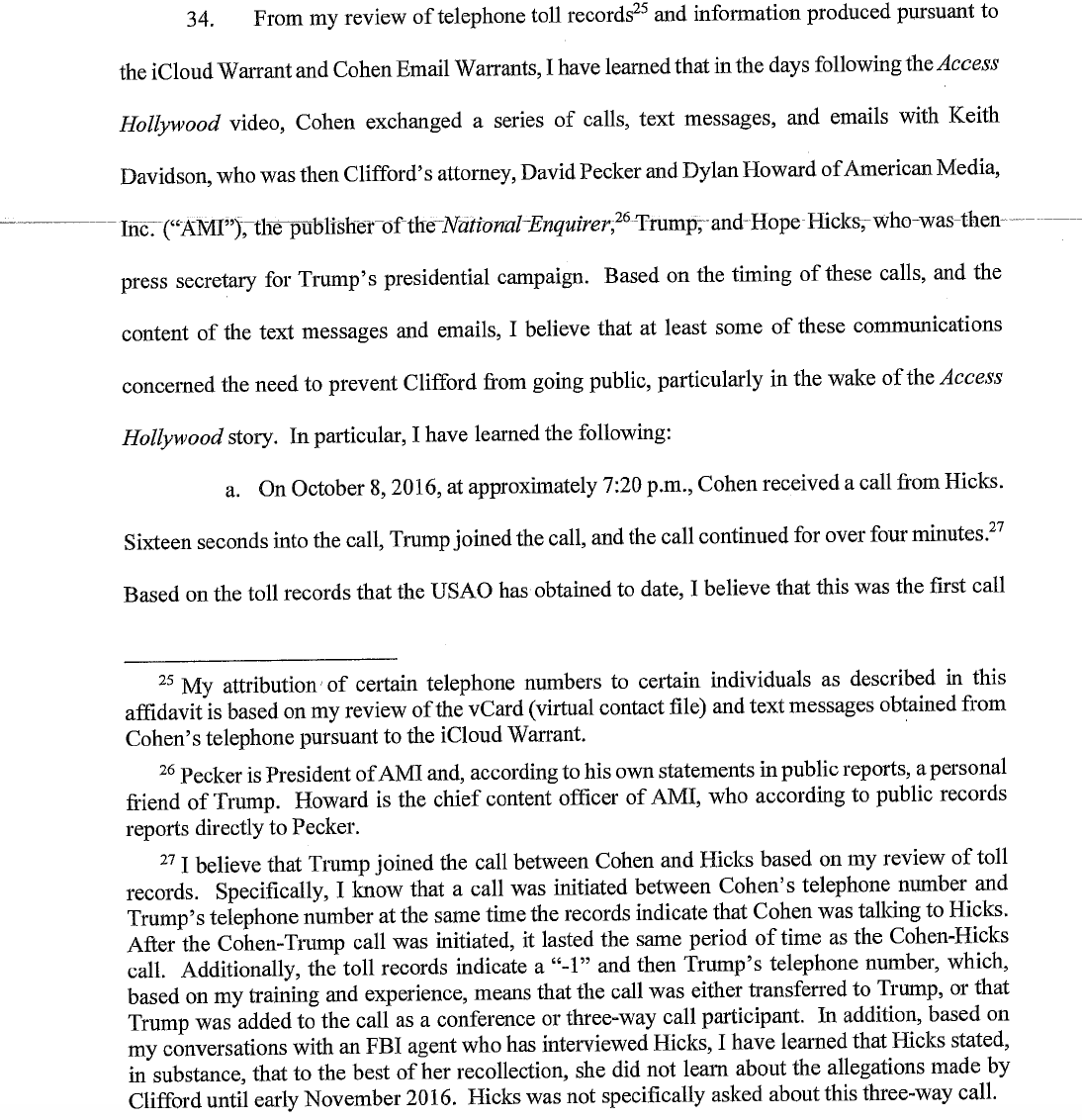
“I believe that Trump joined the call between Cohen and Hicks based on my review of toll records. Specifically, I know that a call was initiated between Cohen’s telephone number at the same time the records indicate that Cohen was talking to Hicks. After the Cohen-Trump call was initiated, it lasted the same period of time as the Cohen-Hicks call,” the agent said. “In addition, based on my conversations with an FBI agent who has interviewed Hicks, I have learned that Hicks stated, in substance, that to the best of her recollection, she did not learn about the allegations made by Clifford until early November 2016. Hicks was not specifically asked about this three-way call.”
Indeed, in early November–days before the election–Hicks was aware of an imminent storm, namely the Wall Street Journal reporting about the National Enquirer catching-and-killing former Playboy model Karen McDougal’s claim that she had an affair with Trump.
Cohen was pleased at the time that the story wasn’t getting a lot of traction and Hicks replied the she saw a similar lack of traction. “Same. Keep praying!! It’s working!”
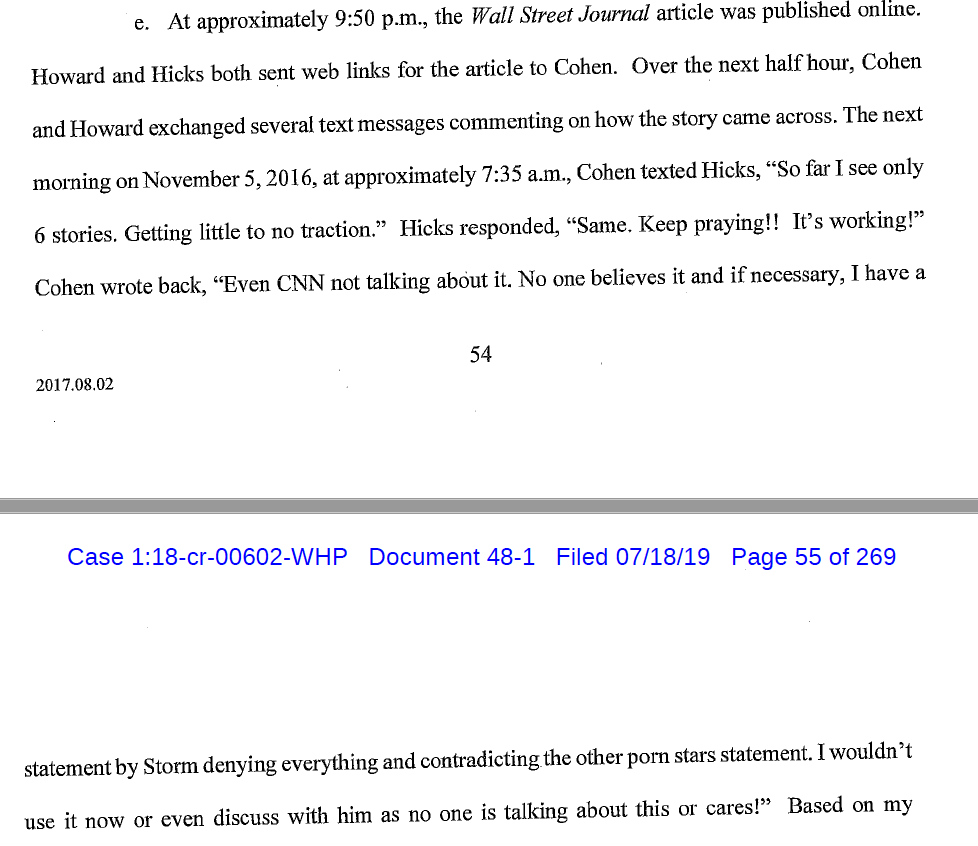
As a result of all of this, Hicks’ June 19 interview before the House Judiciary Committee is now being scrutinized more closely. During it, Rep. Sheila Jackson Lee (D-Texas) asked Hicks directly if she was “ever present when Trump and Cohen discussed Stormy Daniels?”
Hicks replied, “No, ma’am.” Rep. Jackson Lee repeated the question and Hicks again said “No.”
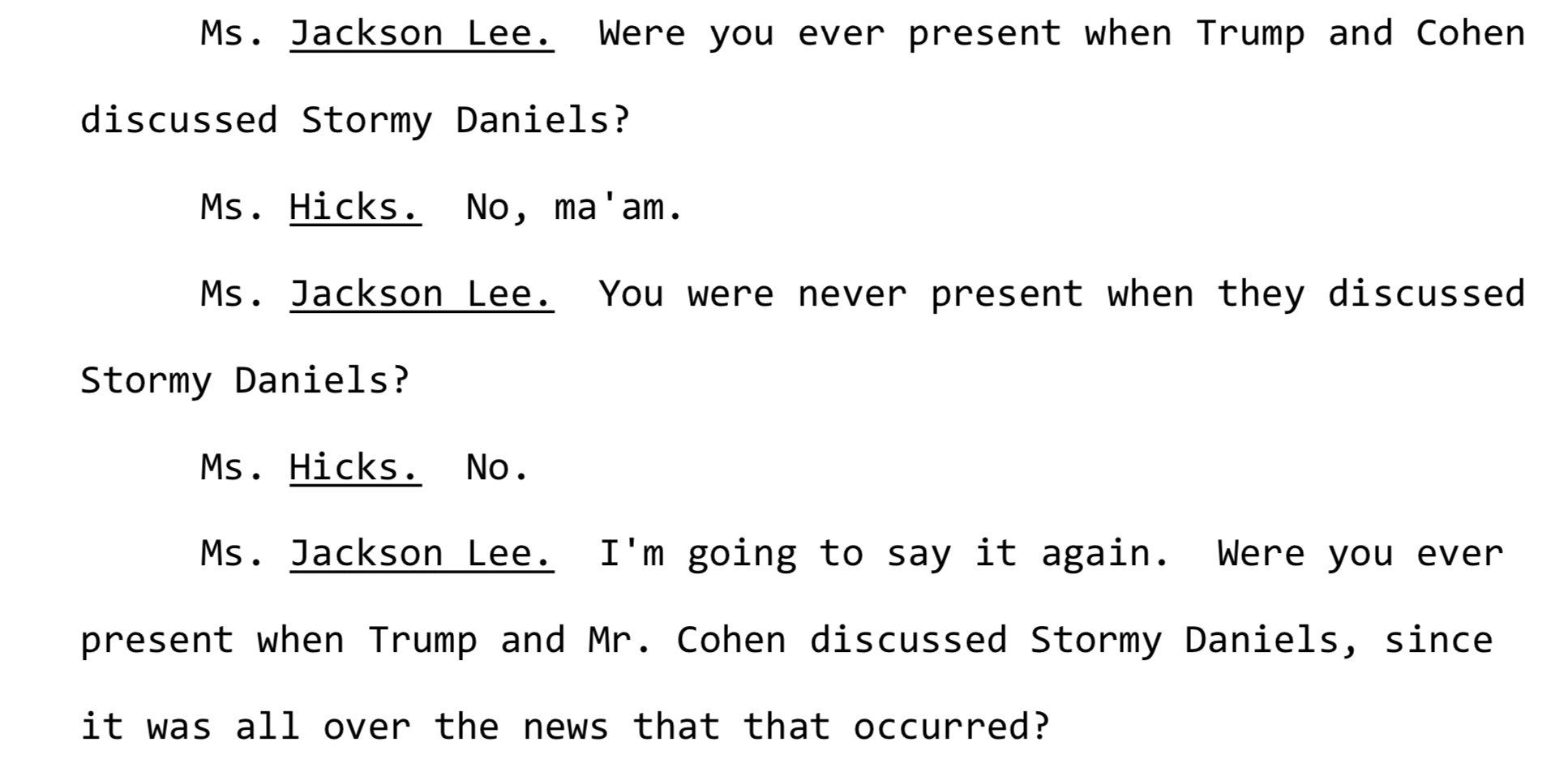
White House lawyer Patrick Philbin interjected on behalf of Hicks to clarify if the questioning was “limited to during [the] campaign.” The three-way phone call is said to have happened in October (during the campaign), and the FBI agent surmised that call included discussion about Stormy Daniels.
Rep. Jackson Lee continued, asking, “So do you know what they would say?”
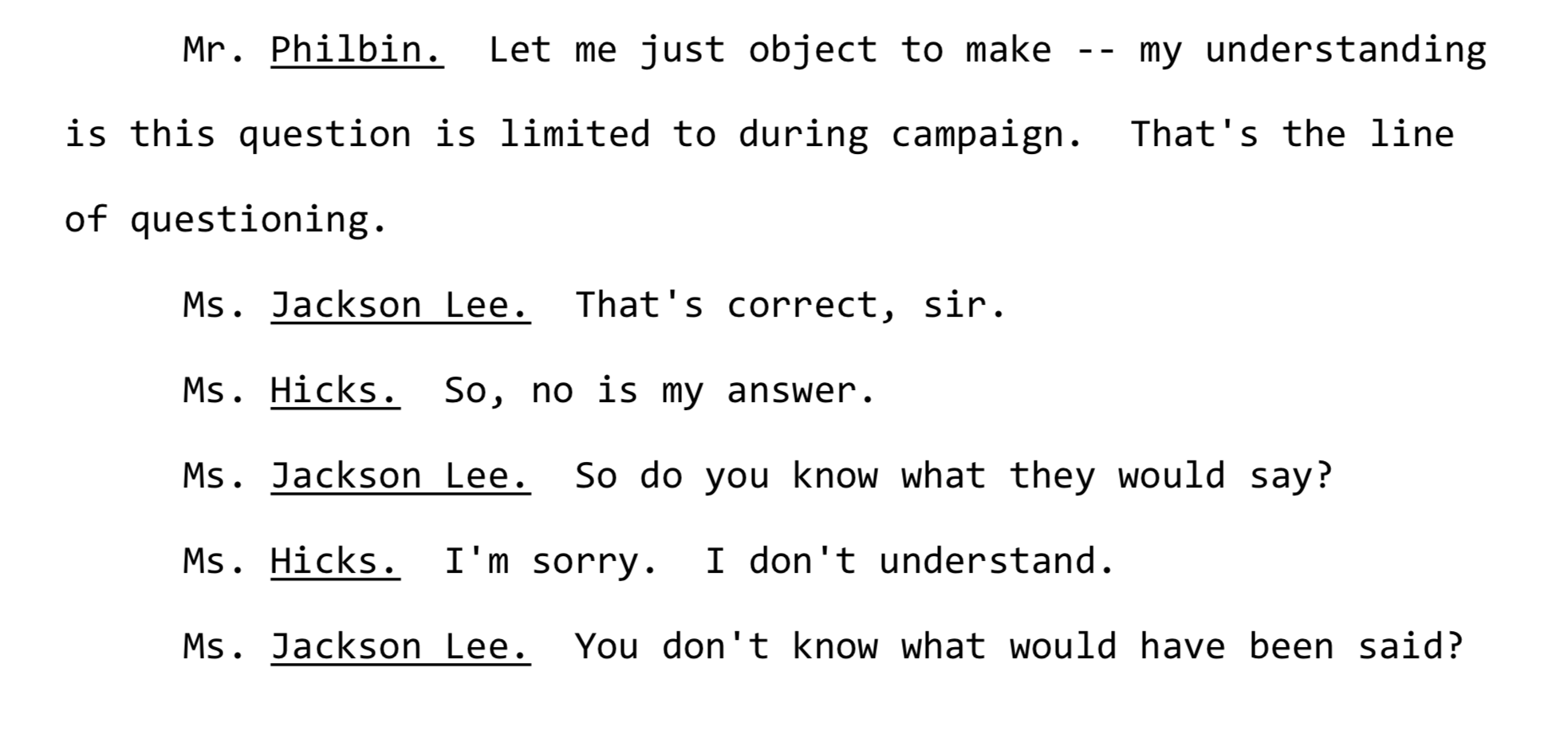
Hicks reiterated that she was “never present for a conversation.”
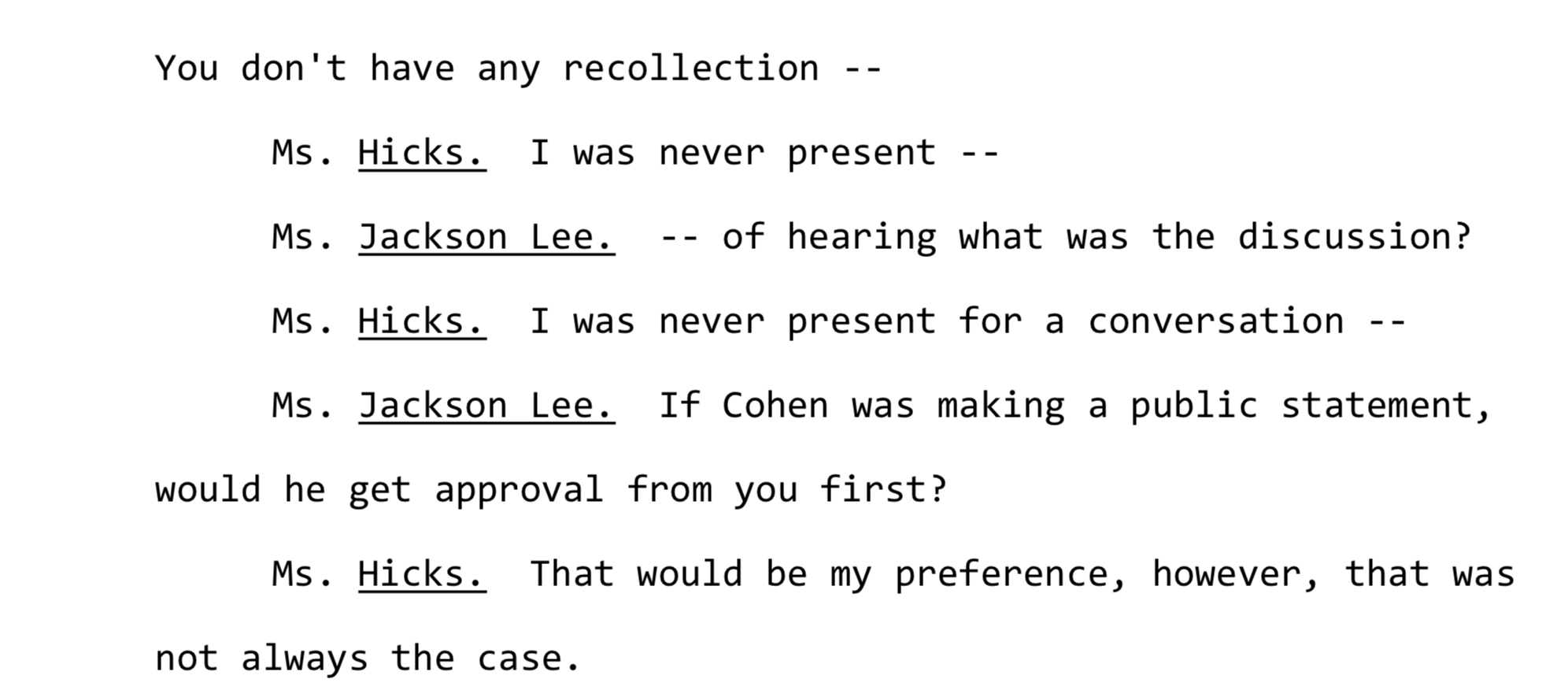
There was no further information in the warrants about what was discussed during that three-party phone call Hicks is said to have joined.
National security lawyer Bradley P. Moss told Law&Crime that while false statement charges are “rarely ever open and shut cases,” the search warrant evidence “raises the distinct and likely possibility that Hicks misled Congress in her testimony.”
“It all comes down to context and actual direct evidence, as opposed to circumstantial evidence that requires degrees of inference. At a minimum, the evidence outlined in the search warrant raises the distinct and likely possibility that Hicks misled Congress in her testimony,” Moss told Law&Crime. “It also reflects a situation in which an indictment would certainly be viable: whether the government would prevail at trial is difficult to say for certain without more information.”
While Hicks is out of the woods in terms of the SDNY investigation of campaign finance violations, it’s not clear if that is also true in terms of her congressional testimony.
UPDATE, Friday: Hicks’ lawyer Robert Trout released a statement saying, “Reports claiming that Ms. Hicks was involved in conversations about ‘hush money’ payments on October 8, 2016, or knew that payments were being discussed, are simply wrong.”
“Ms. Hicks stands by her truthful testimony that she first became aware of this issue in early November 2016, as the result of press inquiries, and she will be responding formally to Chairman Nadler’s letter as requested,” Trout continued.
This means that Trout is disputing the FBI agent’s belief about what was discussed on an apparent three-way phone call, involving Trump, Cohen and Hicks.
[Image via Olivier Douliery-Pool and Getty Images]